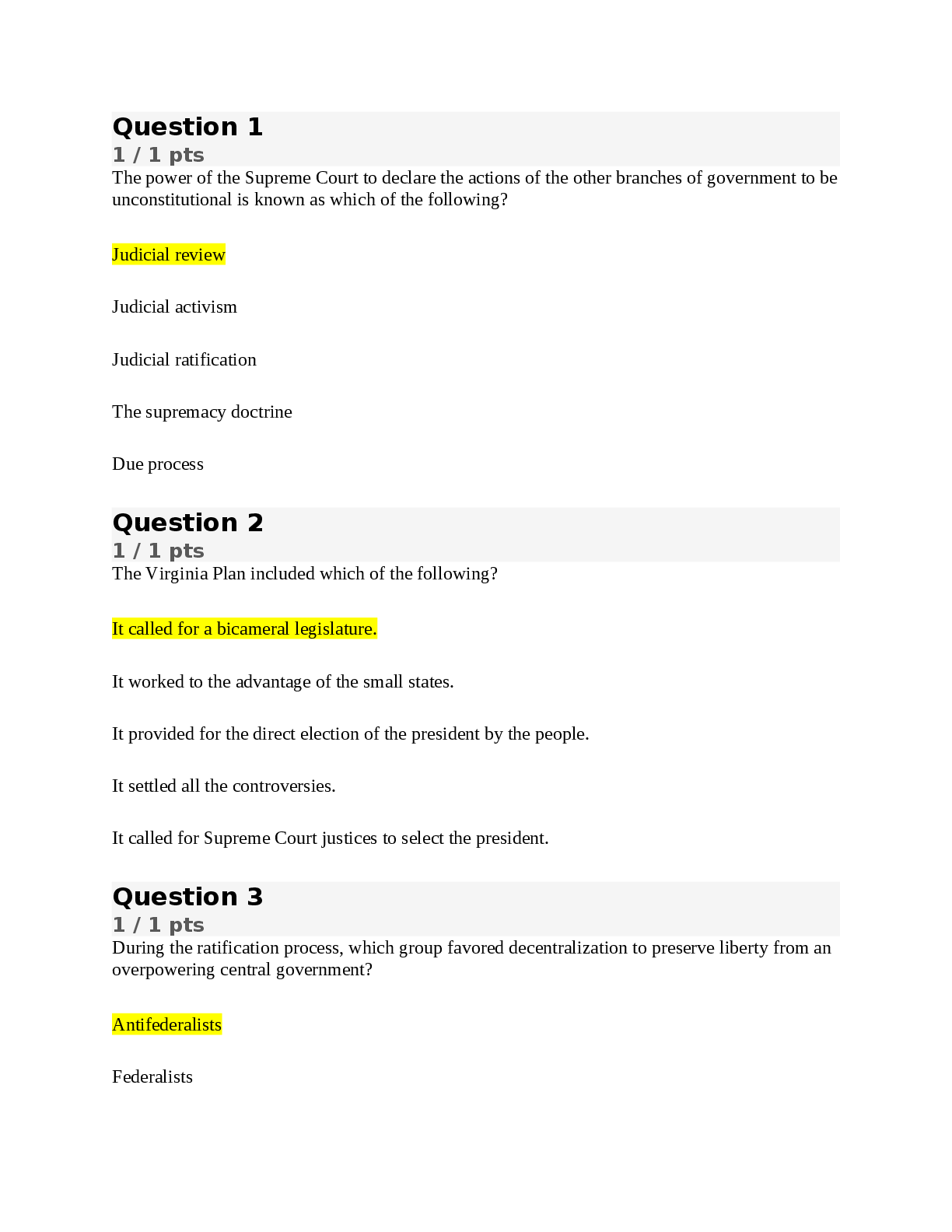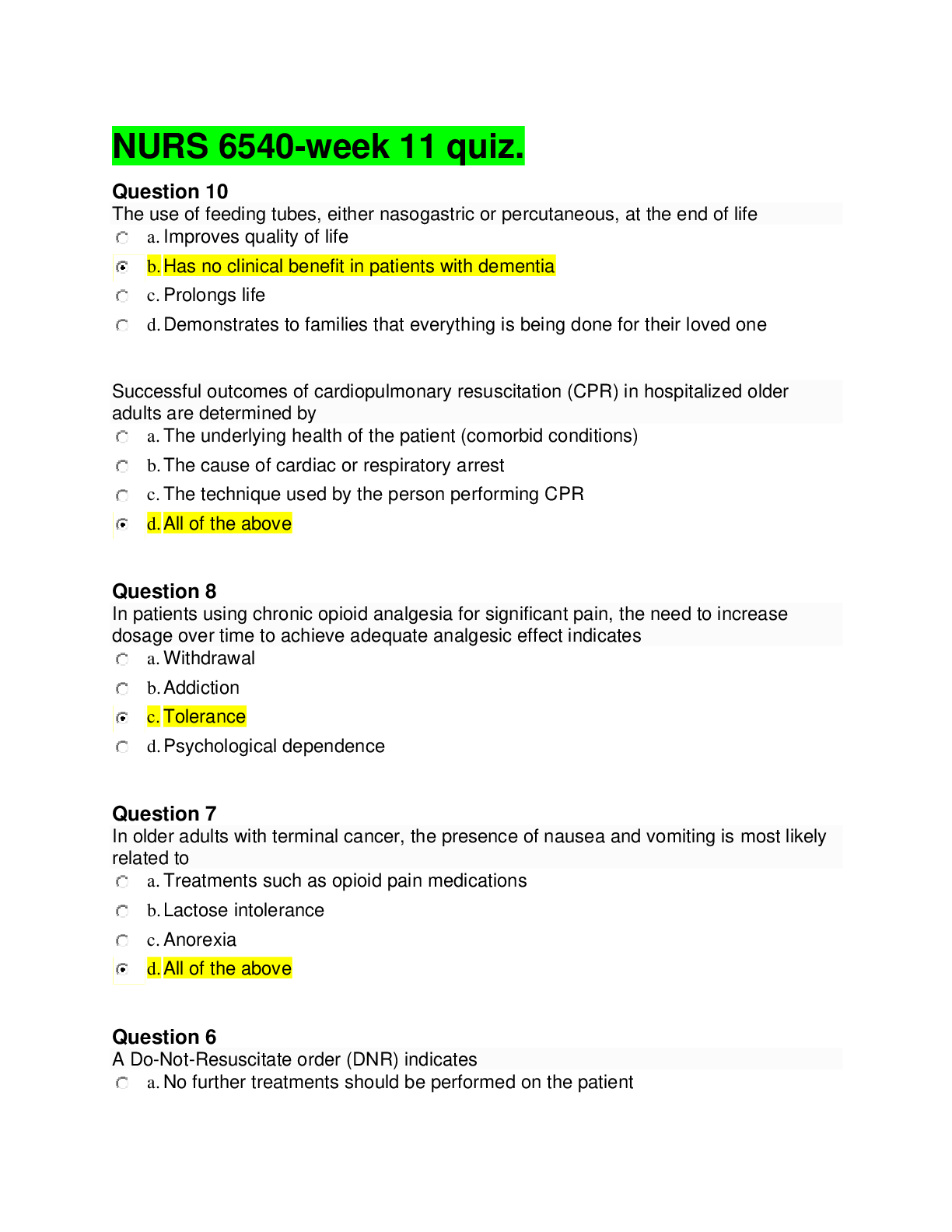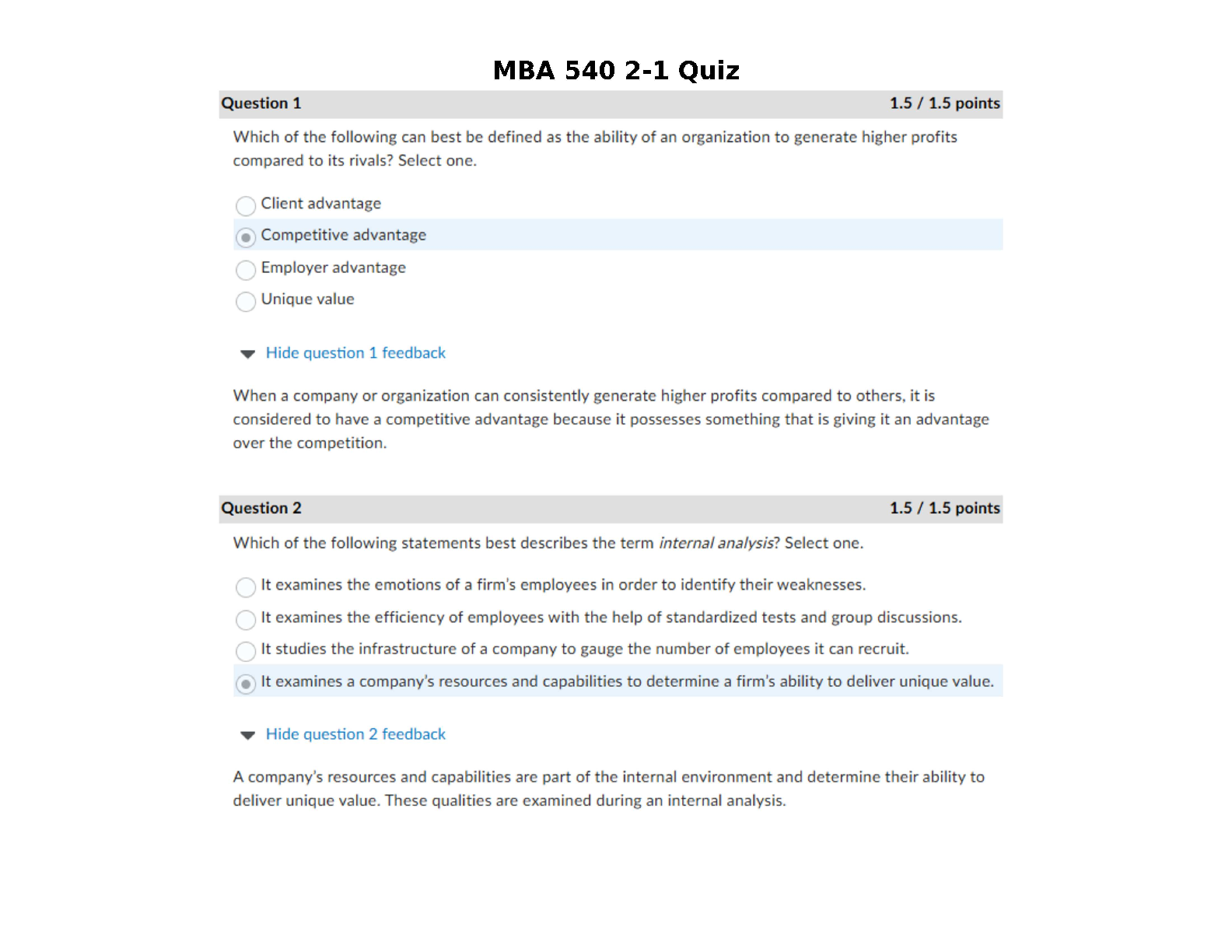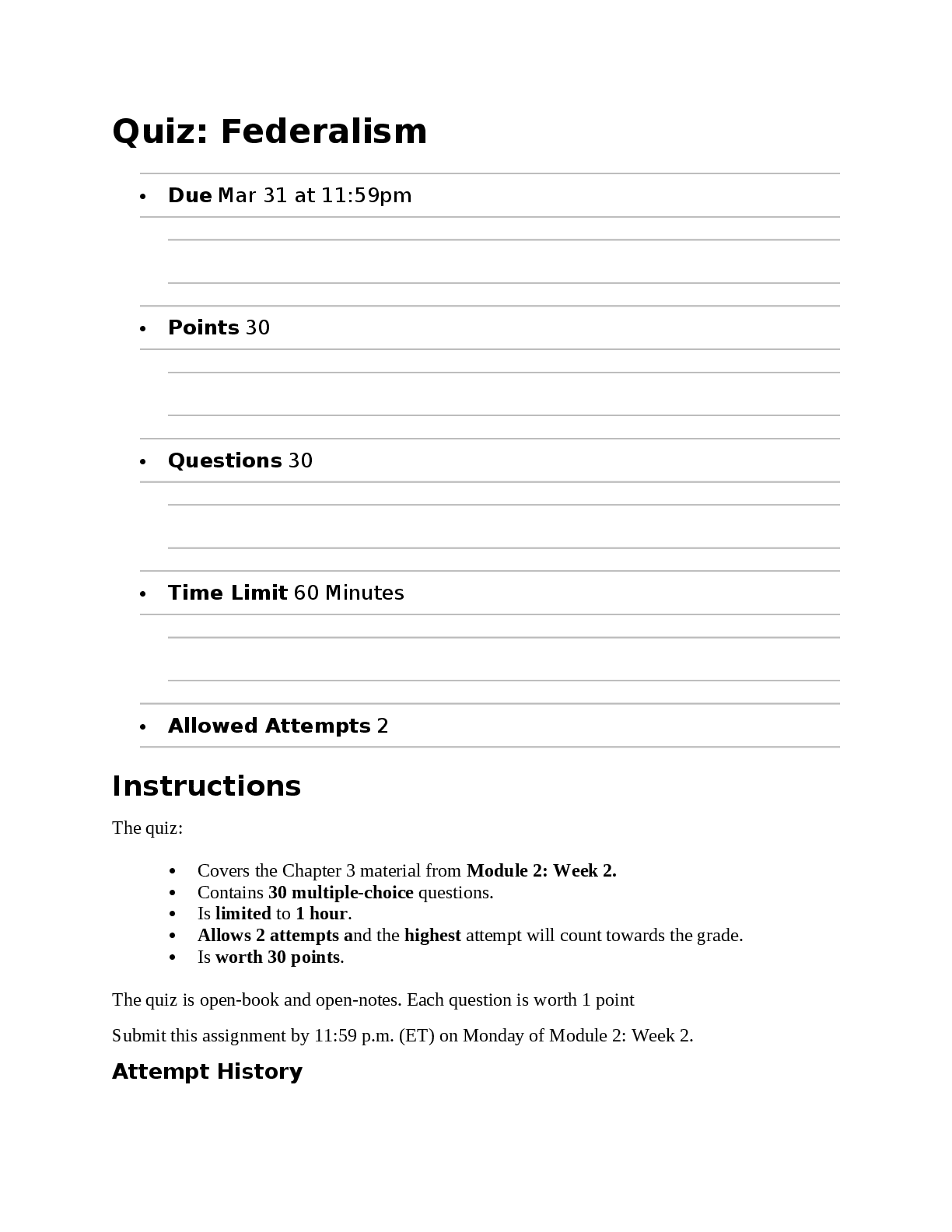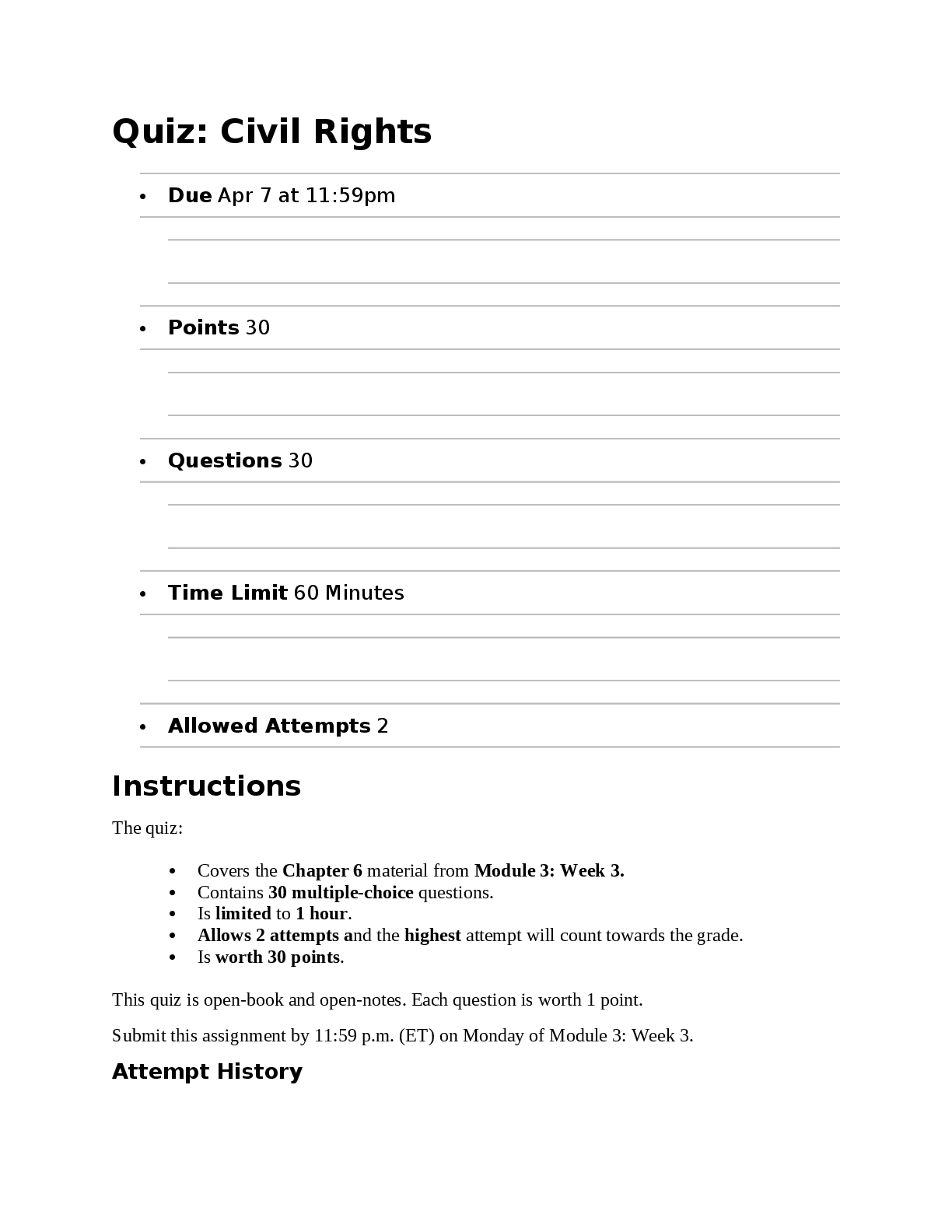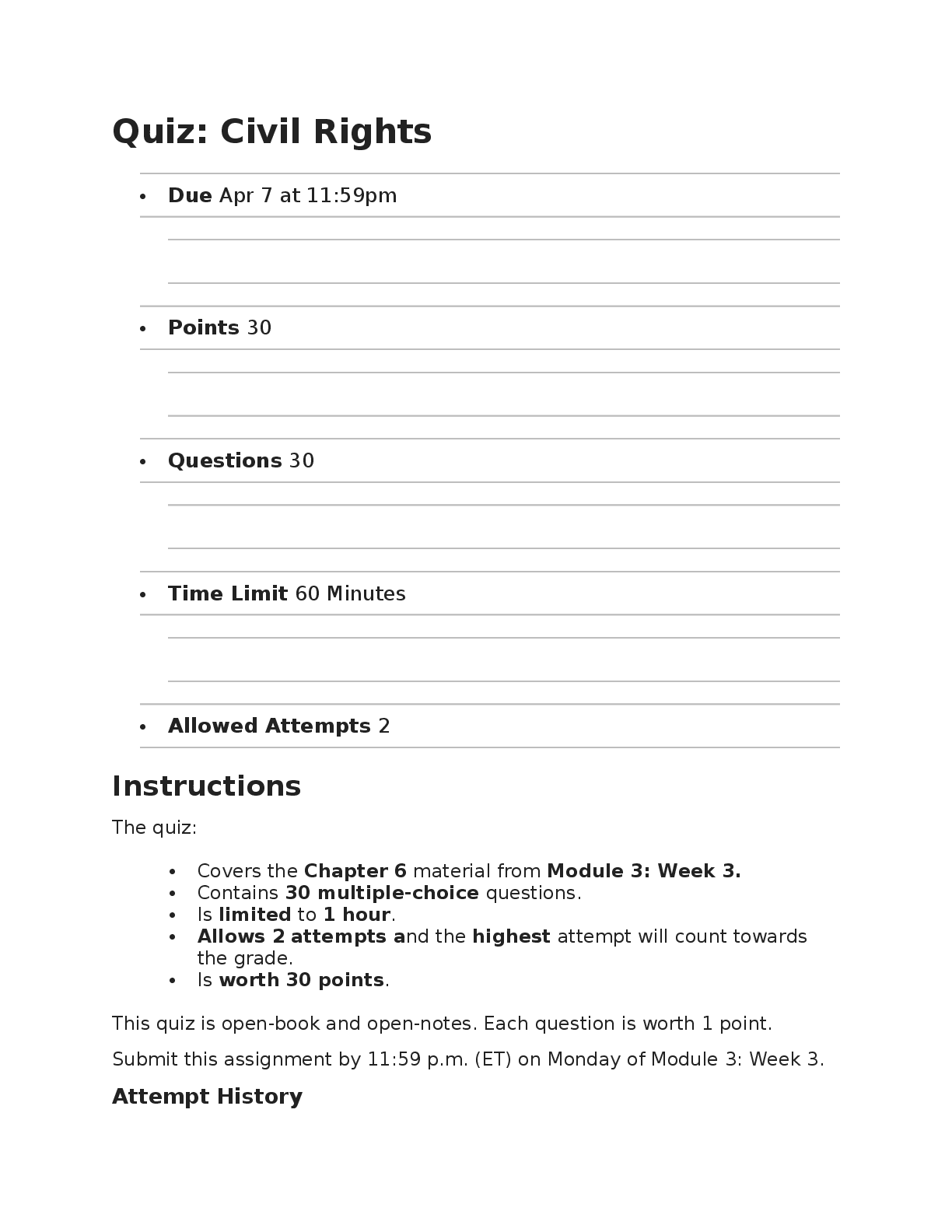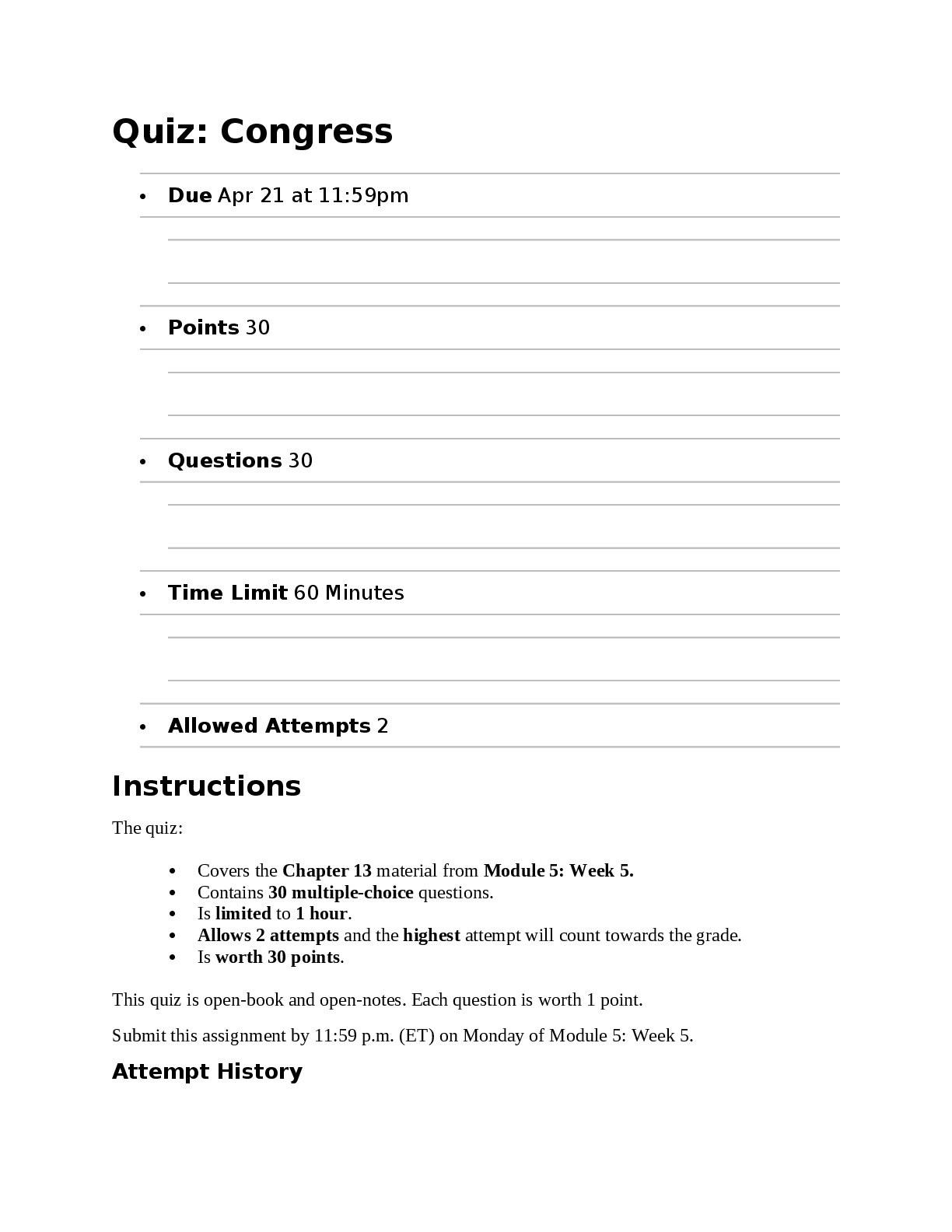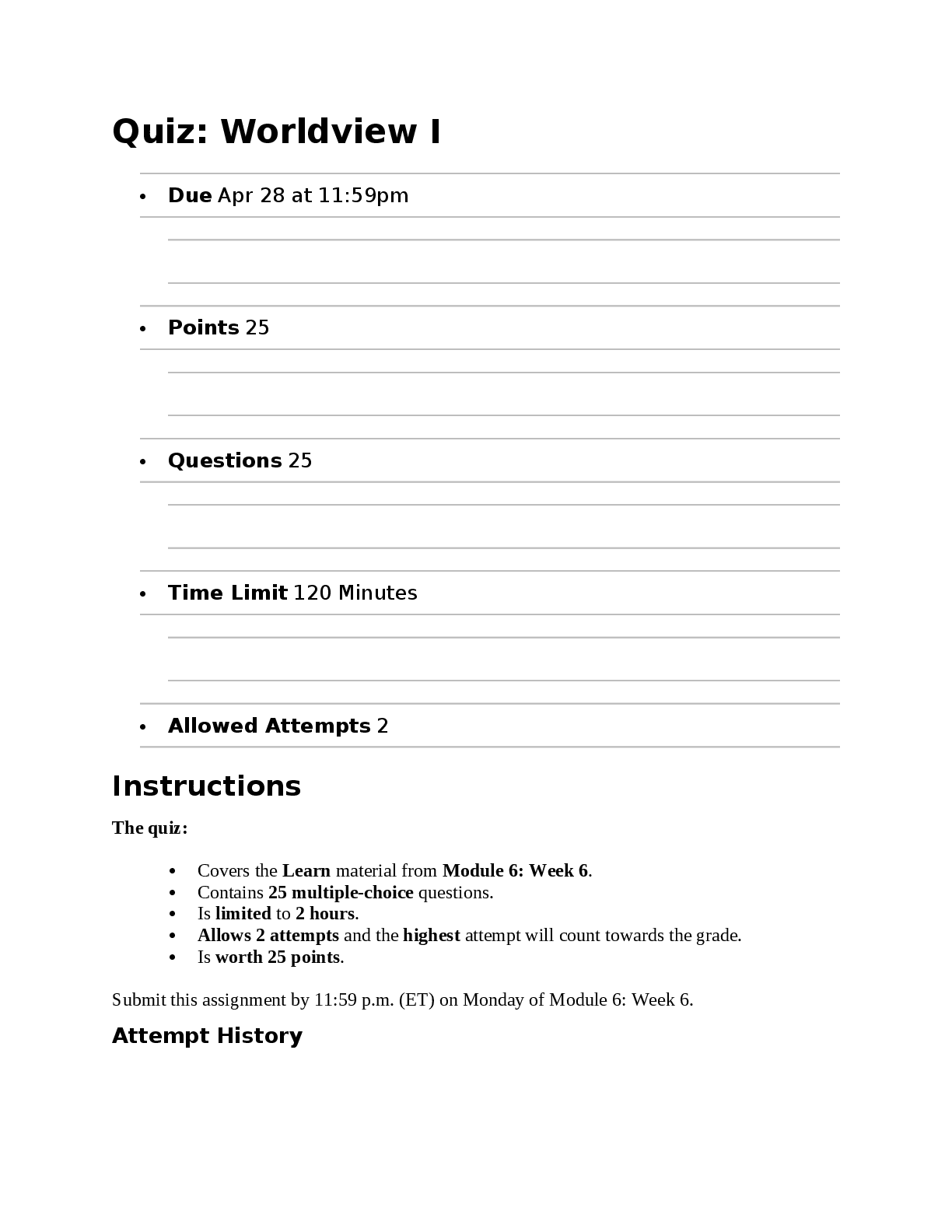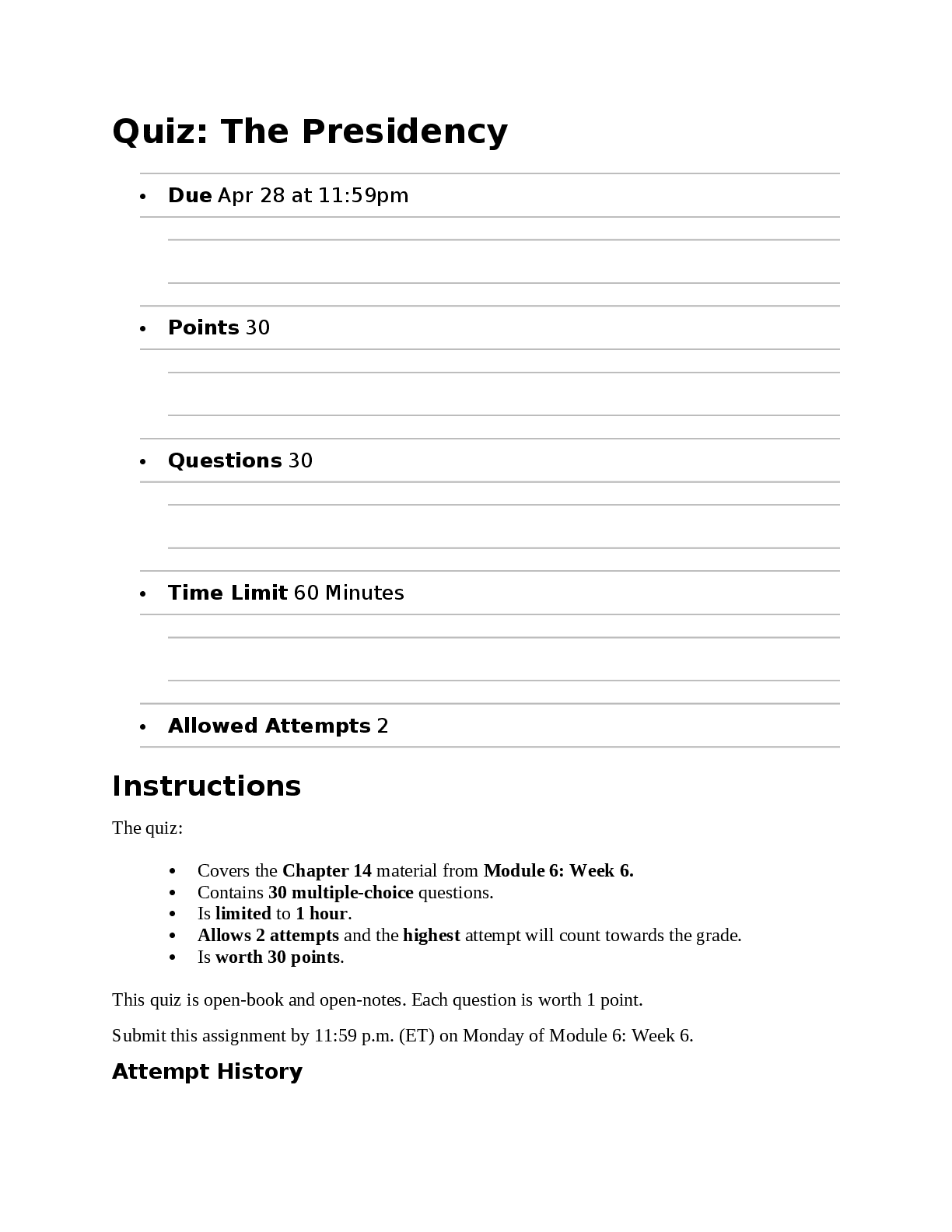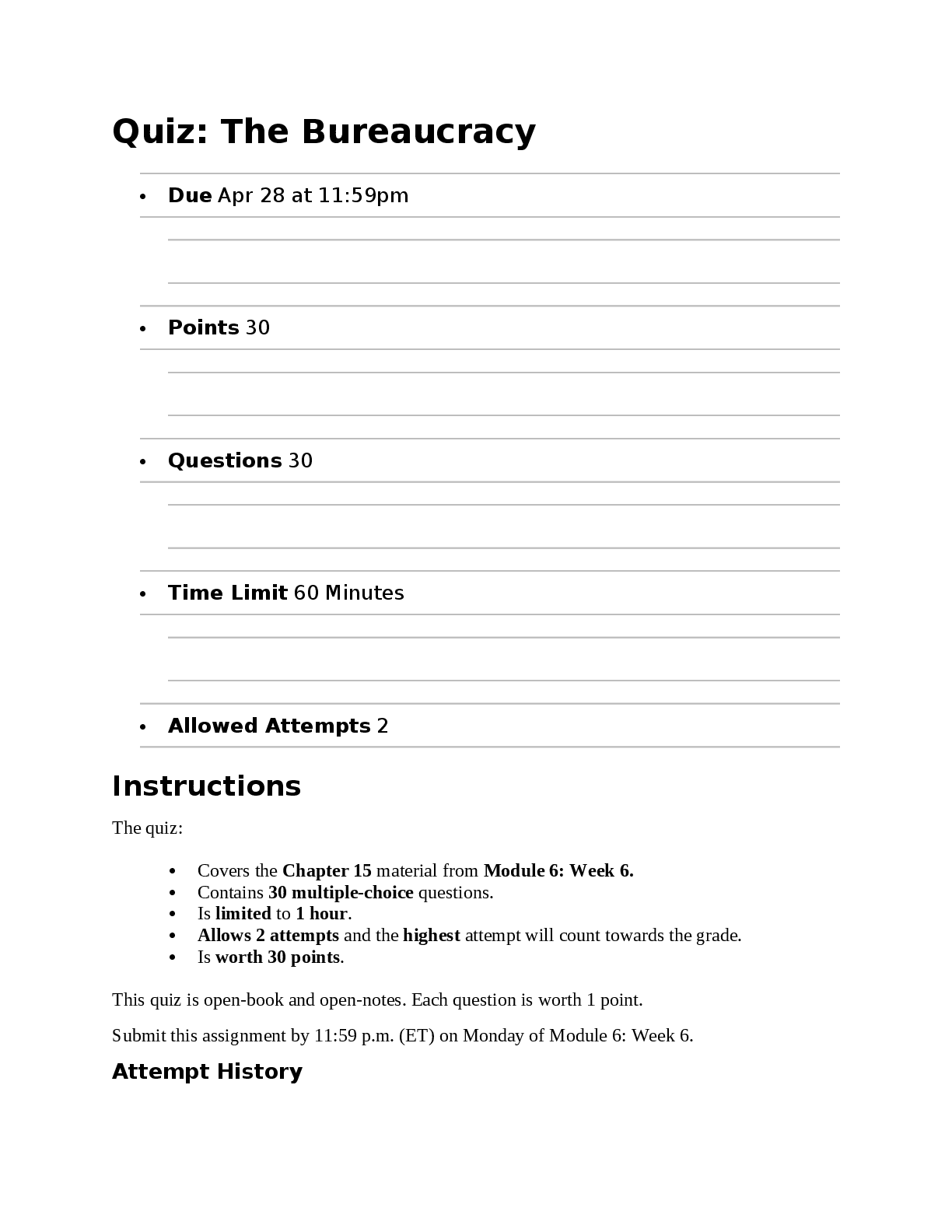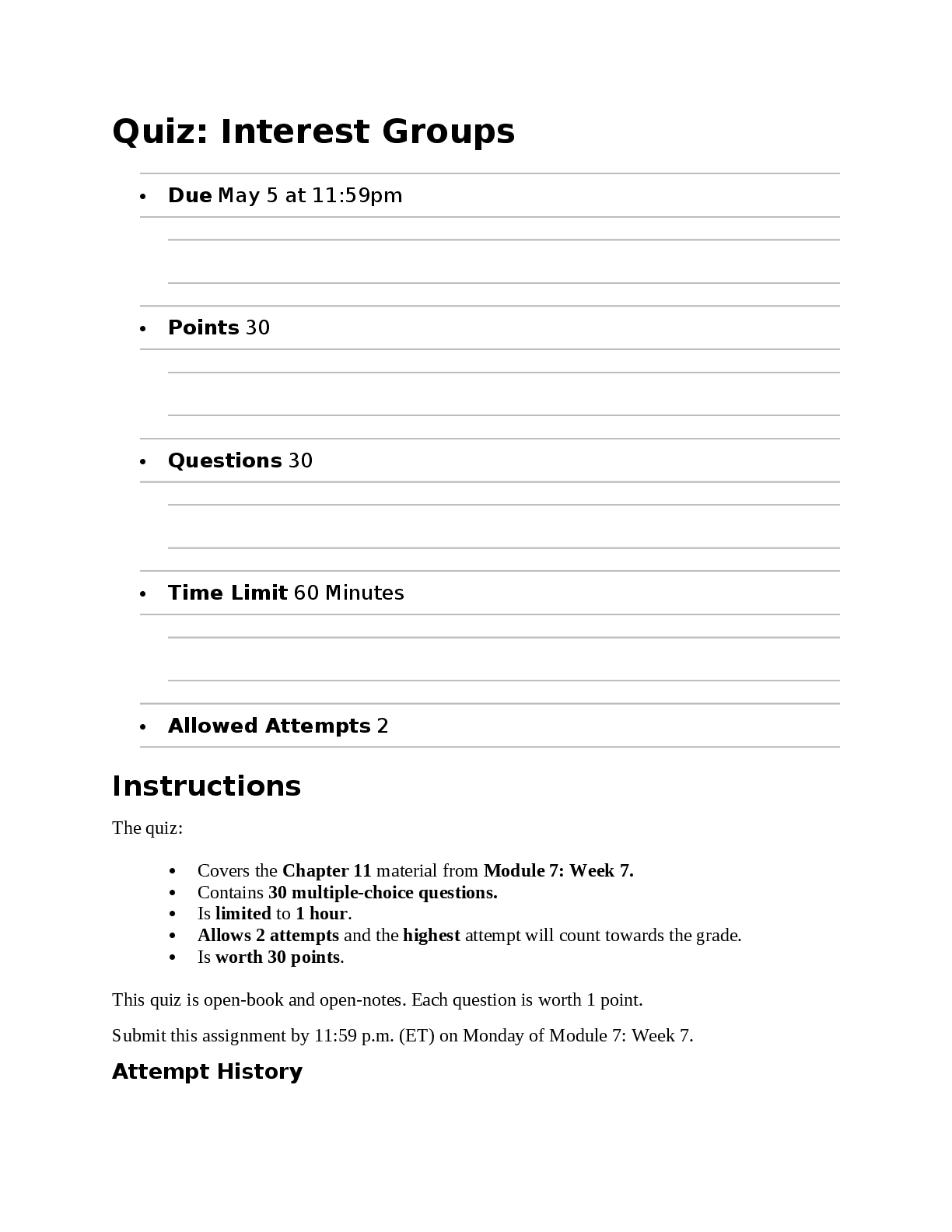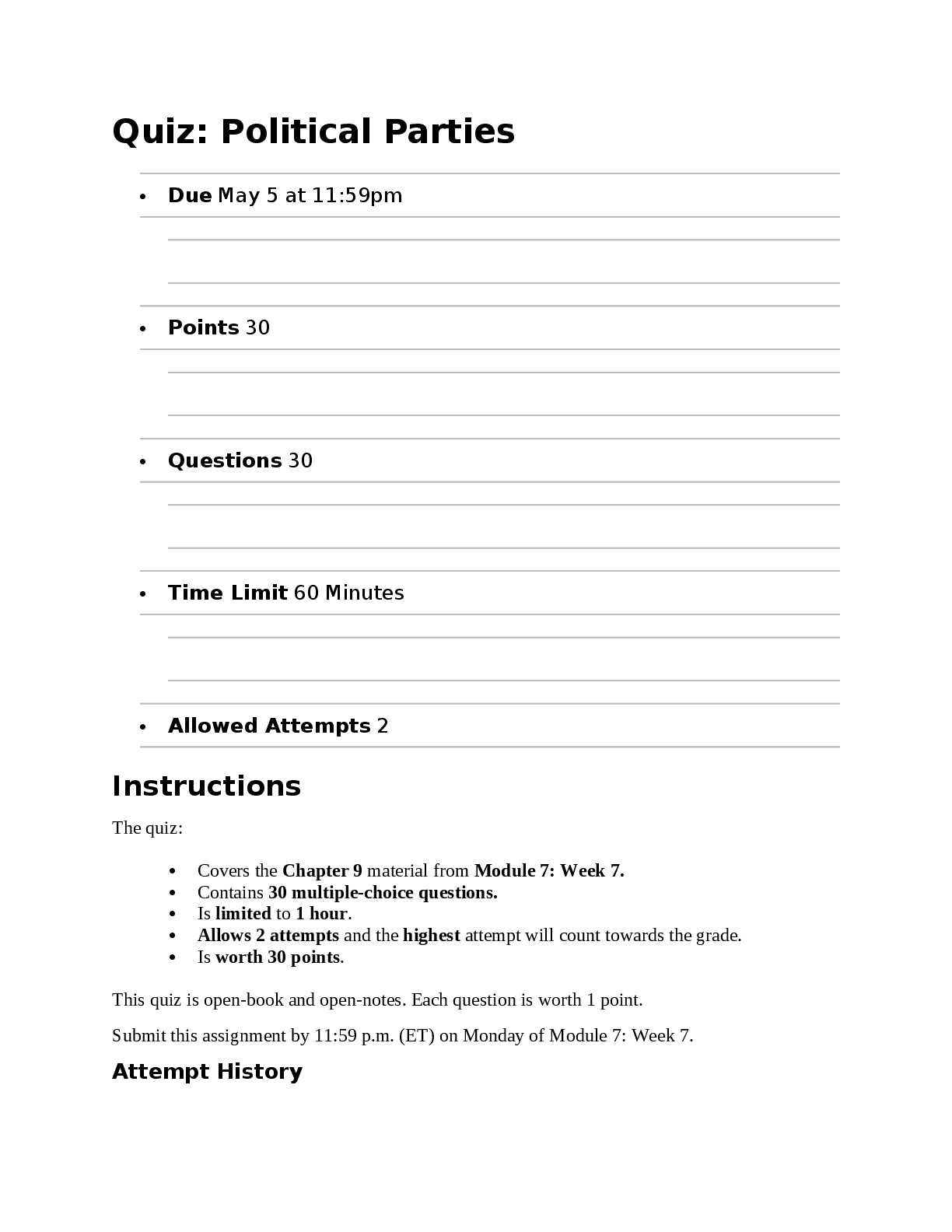Government > Quiz > GOVT 220 Module 8: Week 8 Quiz: Elections and Campaigns|Latest 100% Complete 2025/2026. (All)
GOVT 220 Module 8: Week 8 Quiz: Elections and Campaigns|Latest 100% Complete 2025/2026.
Document Content and Description Below
GOVT 220 Quiz: Elections and Campaigns • Covers the Chapter 10 material from Module 8: Week 8. Question 1 1 / 1 pts Since the mid-1960s, the incumbent reelection rate has never dropped below wha... t percent in the Senate? 60% 65% 75% 80% 90% Question 2 1 / 1 pts What is unlimited money given to political parties but not used to back candidates directly called? Hard money Soft money Issue advocacy PAC money Independent expenditures Question 3 1 / 1 pts Which of the following statements about campaign advertisements is true? They significantly affect voter turnout. They are overwhelmingly positive. All negative ads provide misinformation. Negative ads can provide more information to voters than positive ads. There were many fewer ads in recent elections than in the past. Question 4 1 / 1 pts Which of the following best describes what is allowed because of the 2010 Supreme Court decision in Citizens United v. FEC? Corporations, unions, and individuals can donate unlimited funds to presidential campaigns. Corporations, unions, and individuals can donate unlimited funds to entities that are independent of the candidates. Corporations, unions, and individuals can donate unlimited funds to political parties. Political parties can create special funds from federal monies to donate to candidates. Corporations, unions, and individuals can donate unlimited funds to presidential campaigns as well as to entities that are independent of the candidates. Question 5 1 / 1 pts After party caucuses were replaced by national nominating conventions, who wielded the real power in selecting presidential nominees? The voters in primary elections Local party leaders Members of Congress Nonpartisan groups that sought to pick the best candidates The voters in caucus elections Question 6 1 / 1 pts From what source does the funding of congressional elections come? Public sources only Private sources only Party sources only A combination of public, party, and private sources The parties and public sources Question 7 1 / 1 pts What is the most important factor in winning the presidency? Partisanship The health of the nation Candidate character Fundraising Organization Question 8 1 / 1 pts Which of the following describes the effect of money on campaigns? More important to congressional elections than to presidential elections Less important to congressional elections than to presidential elections Neither more nor less important to congressional elections than to presidential elections Either more or less important to congressional elections than to presidential elections, depending on whether the election is a midterm As important to congressional elections as to presidential elections, but in different ways Question 9 1 / 1 pts An important part of presidential campaigning is activating voters’ latent partisanship. What does this entail? The demonization of the other party’s nominees Assigning blame for recent failures Assigning credit for recent successes Reminding party members why they are party members Getting voters to switch parties Question 10 1 / 1 pts Which of the following states holds the nation’s first and most famous caucus that requires people to attend a meeting of about two hours in which they indicate their preferences and then try to convince those who are undecided to join their candidate’s group? Alaska Iowa New Hampshire New Mexico South Carolina Question 11 1 / 1 pts Debates have the most influence on which group? The disengaged The uninformed Strong partisans Undecided voters Third-party voters Question 12 1 / 1 pts In the 1980 presidential election, many people voted for Ronald Reagan over Jimmy Carter as a vote against Carter’s job performance. This is an example of what? Spin vote Retrospective vote Prospective vote Informed vote Inclined vote Question 13 1 / 1 pts Why may debates move opinion less than conventions? Debates generally have very low viewership. Debates are overly negative. Conventions are generally later in the election season. Debates are later in the election season, and voters at that point often have more crystallized opinions about the candidates. Conventions are generally more persuasive than debates. Question 14 1 / 1 pts The Constitution spells out in detail the workings of which institution that chooses the president? Electoral college Federal Election Commission House of Representatives Senate State legislatures Question 15 1 / 1 pts From what source does most of the money for congressional candidates come? PACs Major corporations Small businesses Super PACs Individuals Question 16 1 / 1 pts The campaign finance law created in the 1970s was the direct byproduct of what? The Watergate scandal The adoption of the Twenty-Sixth Amendment Decreasing voter turnout Wage and price controls The Chicago riots Question 17 1 / 1 pts How does income shape partisan loyalty? Those in the bottom third of income earners generally support the Democratic Party, and those in the upper third generally support the Republican Party. Those in the bottom third of income earners generally support the Republican Party, and those in the upper third generally support the Democratic Party. Income generally does not show a consistent pattern of partisan support in presidential elections. Those in the upper 1% tend to vote for Democrats. Middle-income voters tend to support Democrats, and the low-income and wealthy support the Republicans. Question 18 1 / 1 pts Which of the following best describes the impact the 2010 Citizens United decision has had on the political campaign process? It allowed corporate entities to directly coordinate candidate or campaign events. It opened the door to negative campaigning on a national level. It allowed corporate entities to contribute unlimited amounts to support or oppose candidates. It closed the door to super PAC involvement in political campaigns. It restricted the contributions of corporate or international donors. Question 19 1 / 1 pts Which of the following statements about the role of elections in the enactment of public policy is true? Elections generally do not result in shifts in public policy. Elections always result in massive shifts in public policy. Elections only produced changes in public policy prior to the 1960s. Elections result in changes to public policy, but often not swift or quick changes. Elections only result in changes to policy when there is a divided government. Question 20 1 / 1 pts The Supreme Court ruling in Citizens United v. FEC supports which of the following? Corporations, unions, and interest groups can fund campaign advertising without limits if it is not coordinated with a campaign. Restrictions on campaign language used in negative advertising about other candidates Unrestricted advertising by, for, or about political candidates The elimination of super PACs The unrestricted role of big business in political campaigns and candidate advertising Question 21 1 / 1 pts Historically, what patterns have emerged regarding women's support of the Democratic Party? Women's support of the Democratic Party has increased since the 1990s. Women's support of the Democratic Party has declined since the 1970s. Women's support of the Democratic Party has remained very high over time. Women's support of the Democratic Party has remained very low over a long time period. Women's support of the Democratic Party has fluctuated greatly since the 1990s. Question 22 1 / 1 pts Electoral coattails refers to what? The formal attire of presidential candidates Coordinated campaigns between different offices in the same party Competition between the two main parties How more attractive candidates perform better in national elections The winning presidential candidate’s positive effect on congressional elections Question 23 1 / 1 pts Most demographic groups favor one party or the other by about what percent? 25% or more 20% 15% 10% 5% or less IncorrectQuestion 24 0 / 1 pts Which of the following best describes the effects of gerrymandering? Nonexistent More serious than most people realize Less serious than many people claim About as serious as most people believe Often contradictory to expectations Question 25 1 / 1 pts Which of these is an example of a positional issue? Abortion Growing the economy Ethics in politics Trustworthiness Prosperity IncorrectQuestion 26 0 / 1 pts Approximately what percentage of political ads in 2016 were negative? 90% 80% 60% 40% 10% Question 27 1 / 1 pts What has been the effect of the conventions being held in close proximity to each other? They have more influence over voters as viewership is even higher. They have less influence because the rapid succession leaves little time for the candidate's message to sink in with voters. It drives voter turnout to record highs. It disengages the voters. It does not really have much effect. IncorrectQuestion 28 0 / 1 pts Since the mid-1960s, the incumbent reelection percentage in the House has never dropped below what percentage? 60% 65% 75% 80% 90% Question 29 1 / 1 pts Why are demographic trends in partisan support important for candidates to understand? It can inform campaign strategy, including which groups to attempt to mobilize through campaign appeals. There does not tend to be fluctuations in a group's support of the party, so it informs their baseline of support in any given election. Converting the other side is easier than mobilizing one's own base, so it can inform who to convert from the opposing party's supporters. It does not necessarily inform the candidate since the patterns seem random. It helps more in presidential elections than in congressional or state campaigns. Question 30 1 / 1 pts When a popular candidate influences the success of other candidates on the same party ticket, it is called which of the following? Partisan effect Carry over effect Bradley effect Incumbent effect Coattail effect Quiz Score: 27 out of 30 [Show More]
Last updated: 3 weeks ago
Preview 1 out of 14 pages
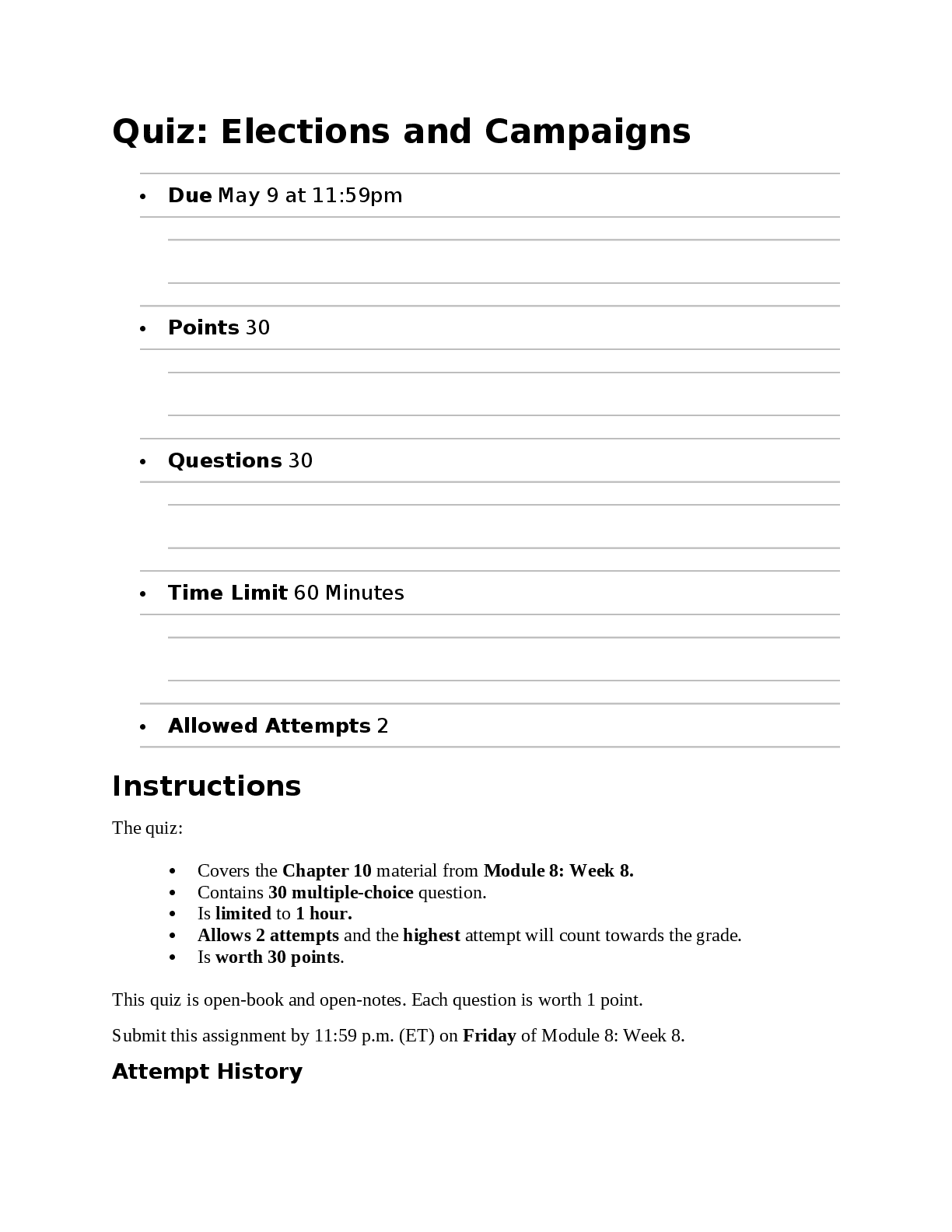
Buy this document to get the full access instantly
Instant Download Access after purchase
Buy NowInstant download
We Accept:

Reviews( 0 )
$11.00
Can't find what you want? Try our AI powered Search
Document information
Connected school, study & course
About the document
Uploaded On
Jul 09, 2025
Number of pages
14
Written in
Additional information
This document has been written for:
Uploaded
Jul 09, 2025
Downloads
0
Views
11
